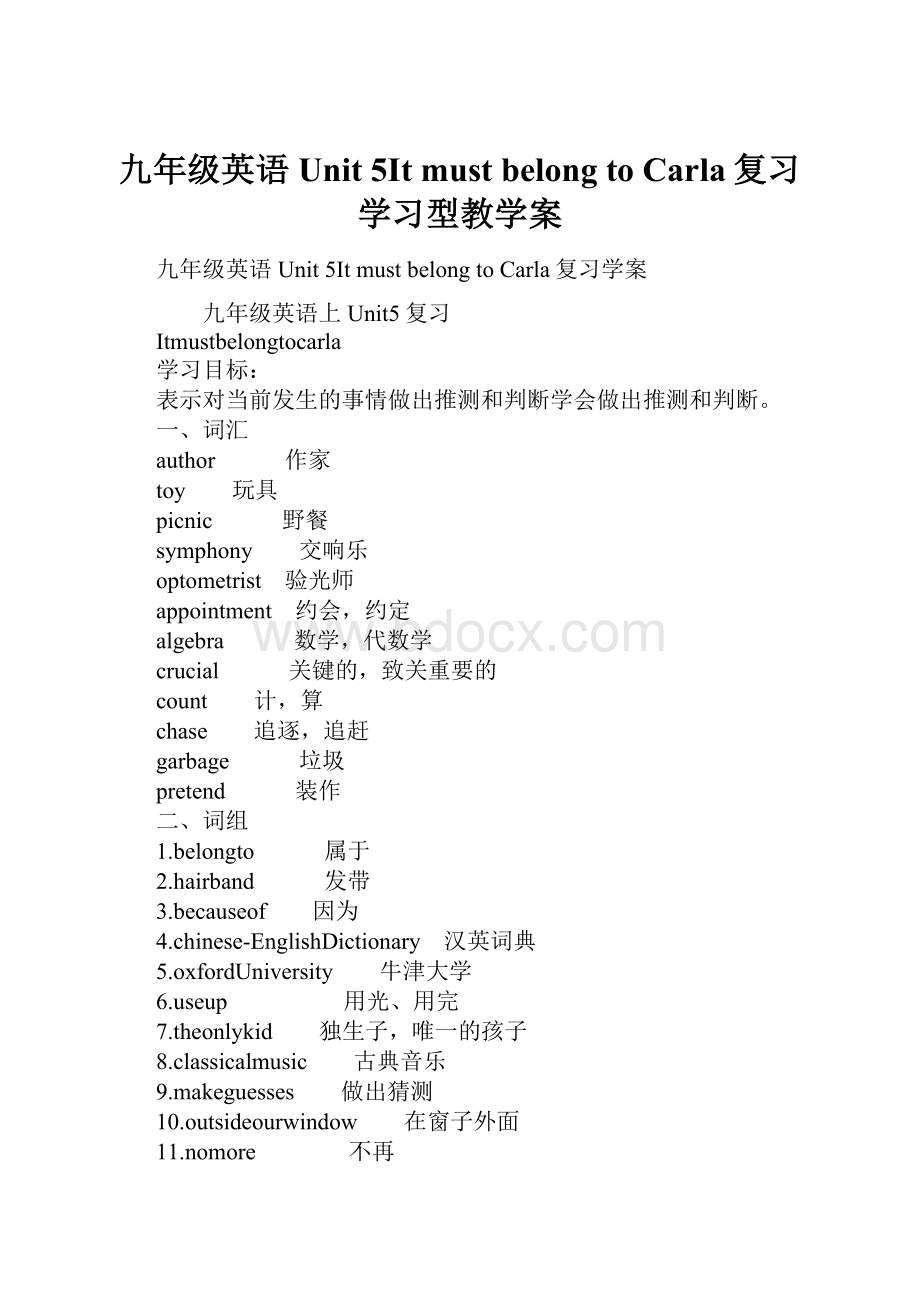九年级英语Unit 5It must belong to Carla复习学习型教学案.docx
《九年级英语Unit 5It must belong to Carla复习学习型教学案.docx》由会员分享,可在线阅读,更多相关《九年级英语Unit 5It must belong to Carla复习学习型教学案.docx(11页珍藏版)》请在冰豆网上搜索。

九年级英语Unit5ItmustbelongtoCarla复习学习型教学案
九年级英语Unit5ItmustbelongtoCarla复习学案
九年级英语上Unit5复习
Itmustbelongtocarla
学习目标:
表示对当前发生的事情做出推测和判断学会做出推测和判断。
一、词汇
author 作家
toy 玩具
picnic 野餐
symphony 交响乐
optometrist 验光师
appointment 约会,约定
algebra 数学,代数学
crucial 关键的,致关重要的
count 计,算
chase 追逐,追赶
garbage 垃圾
pretend 装作
二、词组
1.belongto 属于
2.hairband 发带
3.becauseof 因为
4.chinese-EnglishDictionary 汉英词典
5.oxfordUniversity 牛津大学
6.useup 用光、用完
7.theonlykid 独生子,唯一的孩子
8.classicalmusic 古典音乐
9.makeguesses 做出猜测
10.outsideourwindow 在窗子外面
11.nomore 不再
12.escapefrom 逃离
13.becarefulof 留神、当心
三、日常用语
1.whosevolleyballisthis?
Itmustbecarla’s.Shelovesvolleyball.
2.whoseFrenchbookisthis?
ItcouldbeAli’s.ShestudiesFrench.
3.whoseguitaristhis?
ItmightbelongtoAlice.Sheplaystheguitar.
4.whoseT-shirtisthis?
Itcan’tbejohn’s.It’smuchtoosmallforhim.
四、知识讲解
SectionA:
1.Ifyouhaveanyideawhereitmightbe,pleasecallme.
Ifyouhaveanyidea...=Ifyouknow...意为“如果你知道……”。
any用于if引导的条件从句中,有“若干的,有多少”的意思。
例如:
IfyouhaveanytimeI’dliketotalkwithyou.
如果你有(些许)时间,我希望与你谈谈。
2.nomore与not…anymore的区别
二者都表示“不再”,“再没有”的含义但nomore要用在谈数量或程度时,nomore用在说时间时。
例如:
Thereisnomorebread.
没有面包了。
(指数量)
He’snomoregeniusthanIam.
他和我都不是天才。
(指程度)
Hedoesn’tlivehereanymore.
他不住在这里了。
(指时间)
3.IthinkIdroppeditduringtheconcertsoitmightstillbeinthesymphonyhall.
during是介词,意为“在……期间”,其后跟时间段。
在引导时间状语时注意区分和for的用法。
介词for引导时间状语时,很易和during混淆不清。
它们的区别如下:
(1)during用在已知的时期、节日或表示时间观念的名词之前。
其后通常接the、this、that、these、those、my、your、his……等词。
例如:
during the last four days
during the winter
during that time
during my holidays
during our stay in japan
而for则用以表示“有限的”或“无限的”时间概念,通常其后接冠词、数词,复数名词或副词ever。
例如:
for the first time
for two months
for many years
for years
for ever
(2)during的涵义是“当……之际”。
它既可指某个动作在某个时期里连续不断地进行,也可以指某个动作在这段时期里的某个时间发生。
例如:
It snowed all day but stopped snowing during that night.
下了一整天雪,到晚上才停了。
而for的涵义是指某个动作在某个时期里处于连续不断的状态。
例如:
They worked for the whole day.
他们干了一整天。
在某些场合下,for含有“预先安排”或“为了某一目的”之涵义。
表示此意味时,大都和come、go、stay、lend、rent、hire等词连用。
例如:
They will stay with us for the New year.
他们将和我们在一起,共度新年。
SectionB:
(一)However,thesedays,strangethingsarehappeninginourneighbourhoodandeveryoneisunhappy. 然而,最近在我们附近却在发生一些奇怪的事情,并且每个人都不高兴。
1.however是一个转折连词,表示“然而,可是”的意思,与but的意义相同,但however是较正式的说法。
例如:
IknowhowtopronouncethisEnglishword,howeverIcan’twriteit.
我知道怎么读这个英语单词,但是我不知道怎么写。
2.thesedays意为“最近,近来,近几天。
”
3.unhappy是happy的反义词。
unhappy是一个合成词,由un+happy组合而成。
我们常用的在词前加前缀变为其反义词的有:
前 缀
例 词
派生词
un-“不”
happy
unhappy
like
unlike
grateful
ungrateful
friendly
unfriendly
lucky
unlucky
(二)myparentscalledthepolice,buttheycan’tfindanythingstrange.
我的父母亲报了警,但他们也没能发现奇怪的东西。
(1)thepolice可以看作为复数名词,意思是“警察、警方”。
但如果指一个警员,就要用apoliceman或apolicewoman。
(2)can’t在本句中,不表示“推断”,而表示“能力”。
(三)Inmydream,Iwasswimminginanoceanofpaper.
在我的梦中,我浸泡在数不尽的试卷中。
(in)anoceanof,或(in)oceansof是介词短语,口语中常用,意为“极多的,用不尽的”。
在of后接不可数名词或可数名词复数形式均可。
例如:
Hethinkshehasoceansoftime.
他认为他有用不尽的时间。
语法:
表示推测的情态动词。
在英语中,表示对某件事物的确定程度,即表示推测的时候,我们通常会用到以下情态动词,must,might,could,may,can’t,couldn’t.
一.can和could的区别和用法
1.can表示体力和脑力方面的能力,或根据客观条件能做某种动作的”能力”。
例如:
canyouspeakEnglish?
whatcanIdoforyou?
canyoumakeacake?
can用在否定句和疑问句中时有时表示说话人的“猜测”或“不肯定”。
例如:
wherecanhebe?
canthenewsbetrue?
(在日常会话中,can可代替may表示”允许”,may比较正式)
2.could是can的过去式,表示过去有过的能力和可能性,还有怀疑和不肯定的意思(在否定和疑问句中)。
例如:
Thedoctorsaidhecouldhelphim.(能力)
Shecouldn'tskatewhenshewasfiveyearsold. (能力)
Atthattimewethoughtthestorycouldbetrue.(可能性)
could用来提问,是有礼貌的请求could....Please?
语气较为婉转。
例如:
couldIspeaktomr.Smith,please?
couldyouhelpuscarrythisbox,please?
二.跟上组词一样,might也是may的过去式,其用法如下:
1.may的用法:
a.表示”允许”或”请求”。
例如:
mayIcomein?
在使用这一用法时需注意:
may表示”允许”的否定形式是mustnot,意思是”不应该”“不许可”。
例如:
—mayItakethisbookoutofthereading-room?
—No,youmustn't.不行。
b.表示说话人的猜测,认为某一事情”或许”或”可能”发生。
例如:
Hemayknowtheanswer.
TomorrowImaygoshopping.
c.may用在感叹句中可表示祝愿、愿望。
例如:
mayyousucceed.
mayyouhaveapleasantjourney.
2.might的用法:
a.might可以代替may,表示现在时间的动作,但语气较为婉转客气或更加不肯定。
例如:
Hemightnotcometoday.
mightItakeasuggestion?
b.might用来表示现在时间时,还可表示”规劝”。
例如:
youmightpaymoreattentiontospokenEnglish.
三.must与haveto的区别
haveto比较强调客观需要,must着重说明主观看法。
另外haveto能用于更多时态,比较下面的句子:
wehadtobethereatten.我们得在十点钟到那里。
we'llhavetoreconsiderthewholething.这一切我将不得不重新加以考虑。
有时两者都可以用,意思差别不大。
例如:
wemusthavetoleavenow.我们得走了。
must在表示说话人对事物的推测时候要注意它比may肯定得多,相当于汉语的”一定”或”准是”。
(只有在肯定句中能这样用。
)
Thismustbeyourroom.
Theremustbeamistake.
在回答由must引起的问题时,如果是否定的答复,不能用mustn't,而需要用needn't或don'thaveto,因为mustn't是”一定不要”的意思。
例如:
—mustwehandinourexercisestoday?
—No,youneedn't.
mustnot的否定形式则表示”不应该”或”不许可”,语气比较强烈。
例如:
youmustn'tplayontheroad.
youmustn'teatanythinguntilyouseethedoctor.
练习检测:
一、单项选择
1.---canyouswimintheriver?
---No,I_____.
A.mustn’t
B.maynot
c.can’t
D.needn’t
2.---MayIgoswimmingnow?
---No,you______.youmustfinishyourhomeworkfirst.
A.mustn’t
B.maynot
c.couldn’t
D.needn’t
3.---Excuseme.whereisthezoo?
---Sorry,Idon’tknow.Askthatpoliceman.He_____know.
A.shall
B.may
c.need
D.would
4.__________Ifinishtheworktoday?
No,youneedn’t.
A.must
B.may
c.can
D.Need
5.---mustIfinishmyhomeworknow?
---No,you_________.youmayhavearestfirst.
A.mustn’t
B.can’t
c.maynot
D.needn’t
6.---Tom,whereisyourfather?
---I’mnotsure.He_______inhisoffice.
A.is
B.maybe
c.maybe
D.may
7.---______________IvisitLucyonSunday,mum?
---yes,you______________.
A.must;can
B.may;may
c.Need;need
D.may;need
8.---whereisTom?
---Hehasn'tcometoschooltoday.Ithinkhe________beill.
A.hasto
B.should
c.may
D.need
9.---canyouflyakite?
---No,I_____.
A.mustn’t
B.needn’t
c.can’t
D.couldn’t
10.Thisbook_____Lucy’s.Look!
Hernameisonthebookcover.
A.mustbe
B.maybe
c.can’tbe
D.mustn’tbe
二、填空新课标第一网
用所给动词的正确形式填空。
(1)---whyisn'tjimhere?
---He'sbusy.He (take)careofhisaunt'sbabyathomenow.
(2)---what'smr.clarkegoingtodotomorrow?
---He'llgofishingifit (notrain).
(3)Linda (make)alotoffriendssinceshecameherelastautumn.
(4)---Didjackfinish (clean)thehousethismorning?
---yes,hedid.
(5)---HaveyouheardoftheGreatwall,mr.Read?
---yes,Ihave.It'saplaceofgreatinterestinchina.
It (build)thousandsofyearsago.
三、选择最佳答语补全对话
misswu:
canIhelpyou?
LiGang:
yes,I'dliketoreturnthisbook,please.
misswu:
(1).
LiGang:
No,Icouldn'treadit.Ihadahardtimereadingafewpages,andthenIdecidedtogiveup.
misswu:
(2).
LiGang:
Itwasn'tthelanguage.Itwasthewords.Theyaretoosmallforme.
misswu:
(3).whatcanIdoforyouthen?
LiGang:
well,I'dbegladifyoucouldfindmeanotherbook.
misswu:
(4).
LiGang:
yes,butonewithbiggerwords.
misswu:
(5).
LiGang:
oh,oliverTwist.Thisoneisfine.Andthewordsaremuchbigger.Thankyouverymuch.
misswu:
you'rewelcome.
A.whataboutthisone?
B.youcan'tkeepthebookforlong.
c.AnotherEnglishstorybook?
D.Isn'titinteresting?
E.oh?
ButIknowyouaregoodatEnglish.
F.Didyouenjoythebook?
G.yes,theyarereallysmall.
四、阅读理解
onceEffendihadajokewiththePrimeminister.Hesaidthattheministerwoulddiethenextday.Thenextday,theministerfelltothegroundfromthehorseandreallydied.whenthekinglearnedthis,hegotangryandsenthismentocatchEffendiatonce.
whenEffendiwasbroughttohim,thekingshoutedangrily,“Effendi,sinceyouknewwhenmyministerwoulddie,youmustknowthedateofyourowndeath.Sayitout,oryou’lldietoday.”
Effendilookedatthekingforawhile.Thenheanswered,“ButhowcanIknow?
I’lldietwodaysearlierthanyou.”ThekingwasafraidthatifhekilledEffendi,hehimselfwoulddieafterthat.HethoughthemustkeepEffendialiveaslongaspossible,soheletEffendigo.
(1)Thisstorytellsus .
A.howEffendifooledtheking
B.whenthekingwoulddie
c.whytheministerdied
D.Effendiknewthedatesofeveryone’sdeath
(2)Theprimeministerdiedbecause .
A.Effendikilledhim
B.Effendisaidhewoulddie
c.Hewasbadlyill
D.Hefellofthehorse
(3)whydidthekingaskEffenditotellhimthedateofEffendi’sowndeath?
A.Becausethekingwantedtoknowwhenhehimselfwoulddie.
B.BecausethewantedtofindanexcusetokillEffendi.
c.BecausehehimselfhadknownthedateofEffendi’sdeath.
D.BecausehewantedtoknowwhenEffendiwoulddie.
(4)ThekingletEffendigobecause .
A.hehopedtolivealonglife
B.hewasafraidofEffendi
c.hedidn’tbelieveEffendi’swords
D.Heknewhewoulddietwodayslater
(5)whichofthefollowingisnottrue?
A.Effendiplayedajokeontheminister
B.Thekingwasafraidofdeath.
c.Effendididn’tknowwhenthekingwoulddie.
D.IfthekingkilledEffendi,hehimselfwoulddietwodayslater.
答案及解析
一、
1.选c。
问句中的can询问“能力”的问句意为“你能在河里游泳吗?
”如果能,则答yes,Ican;如果不能,则答No,Ican’t此题选C。
2.选A。
may开头的问句是“请求许可”的问句意为“我可以现在去游泳吗?
”如果允许,答句是yes,youmay。
如果不允许,答句是No,youcan’t。
如果表示“强烈的”不允许,“决不能”,则答句是No,youmustn’t。
此题意为“现在”你“决不能”去游泳,应该先完成作业。
因此选A。
3.选B。
此题考查学生对情态动词用法的掌握情况。
题中的情景是问路,而被问者并不知道去公园的路,建议问路人去问警察,说警察可能知道。
最后一句说的是一种可能性。
4.选A。
考查情态动词must的用法。
考生错解的原因在于没有掌握它的用法。
5.选D。
此题考查知识点为情态动词must的用法。
考生错解的原因在于没有掌握must引起的一般疑问句的否定回答。
6.选B。
情态动词may后接动词原型“be”,表示一种可能性或推测。
7.选B。
此题考查情态动词的用法。
may用于征求对方的意见。
请注意may的这一用法。
8.选c。
本题主要考查情态动词。
汤姆今天没来上学,他可能是生病了,也有别的可能。
所以只能是一种推测。
故应选c。
9.选c。
10.选A。
mustbe与maybe都表示推测,mustbe表示“一定是、准是”;maybe表示“可能是”,相比之下mustbe的把握性更大些。
二、
(1)istaking
(2)doesn'train
(3)hasmade
(4)cleaning
(5)wasbuilt
三、
(1)F,你喜欢吗?
(2)E,哦?
据我所知,你英语很棒!
(3)G,是的,确实很小
(4)c,还是英语故事书?
(上文提到是英文书)
(5)A,这本好吗?
四、ADBAD